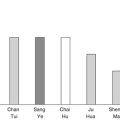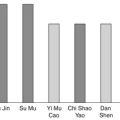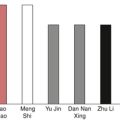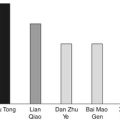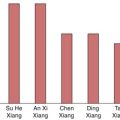Chapter Fifteen. Astringent herbs
 |
1. What are the indications for and characteristics of the astringent herbs?
The astringent herbs have the function of stabilizing the Essence, Body Fluids and Qi. They treat abnormal discharge of the essential substances of the body through excessive sweating, vomiting, urination, spermatorrhea and diarrhea. They can also treat abnormal consumption of the Qi from excessive coughing, shortness of breath, asthma and palpitations. They are sometimes used to stabilize the structure of organs and keep them from slipping from their proper positions in the condition of Qi deficiency, such as seen in prolapse of the rectum or uterus.
The cause of abnormal discharge of the essential substances is Qi deficiency. When the internal organs are very weak, the Qi is not strong enough to keep the Essence and Body Fluids in the body and to keep the organ in its proper place and position, so this disorder occurs. Elderly people and those with chronic disease or a very weak constitution are more likely to have this disorder. The herbs that stabilize abnormal discharge of the essential substances focus on treating the manifestations; however, they have little influence on the organ itself and do not treat the cause, so they should be used together with herbs that treat the causes.
Most of the herbs that stabilize the Qi, Essence and Body Fluids are sour or astringent. Sourness has a contracting ability and an inwards-moving tendency. Herbs with an astringent property are able to prevent or reverse the abnormal leakage of the Qi, Essence and Body Fluids. Of these herbs, some particularly stabilize the Lung-Qi; others are effective at stabilizing the Heart-Qi or the Kidney-Essence, or binding up the intestines.
2. What precautions should be observed in the use of astringent herbs?
In clinical practice, the astringent herbs should be used with caution. First of all, as mentioned above, since these herbs treat only the manifestations, they should be combined with herbs that treat the causes of the disorders. To treat chronic conditions, astringent herbs should be used with herbs that tonify the Qi in order to treat the abnormal discharge completely. In acute conditions—such as in excessive sweating and diarrhea—the astringent herbs can be used alone; however, when the condition is stabilized the appropriate tonifying herbs should then be used immediately.
Secondly, astringent herbs should be used only in Deficiency syndromes. They are prohibited for use in Excess syndromes or syndromes in which Deficiency and Excess coexist—for instance, where there is Dampness, Phlegm and Heat. This is because these herbs are able to stabilize the Essence and Body Fluids, so they can also retain pathogenic factors within the body.
There are many factors that can cause abnormal discharge of the Body Fluids and Essence, therefore correct differentiation of the syndrome is required. The astringent herbs are prohibited for use in the following syndromes: diarrhea caused by Damp-Heat in the intestines, excessive urination or spermatorrhea caused by Damp-Heat in the Lower Jiao, shortness of breath due to accumulation of Phlegm, or excessive sweating due to Excessive- or Deficient-Heat in the body.
3. Which herbs can stabilize the Lung-Qi and Lung-Yin and how should one prescribe them in clinical practice?
The commonly used herbs that particularly stabilize the Lung-Qi are Wu Wei Zi ( Schisandrae fructus), Wu Mei ( Mume fructus), He Zi ( Chebulae fructus) and Bai Guo ( Ginkgo semen). The herbs that stabilize the Lung-Qi can be used to relieve thirst and shortness of breath, and are used in the treatment of asthma, pulmonary pneumonia, pulmonary emphysema, acute and chronic bronchitis, cough and hyperventilation.
There are herbs that can especially stabilize the Exterior, which is governed by the Lung, and stop sweating. These are Ma Huang Gen ( Ephedrae radix)* and Nuo Dao Gen Xu ( Oryzae glutinosae radix et rhizoma).
If there is Lung-Qi deficiency, Ren Shen ( Ginseng radix), Mai Men Dong ( Ophiopogonis radix), Bei Sha Shen ( Glehniae radix) and Nan Sha Shen ( Adenophorae radix) are often used as well to tonify the Qi and nourish the Yin.
If there is Liver-Qi stagnation at the same time, Chai Hu ( Bupleuri radix), Zhi Ke ( Aurantii fructus) and Xiang Fu ( Cyperi rhizoma) are often added.
Herbs that direct the Lung-Qi to descend and transform Phlegm should be added to ensure that the astringent herbs do not obstruct the Lung-Qi and retain the Phlegm—examples are Qian Hu ( Peucedani radix) and Pi Pa Ye ( Eriobotryae folium).
4. Which herbs can stabilize the Heart-Qi and how should one prescribe them in clinical practice?
The herbs that are particularly effective for stabilizing the Heart-Qi are Wu Wei Zi ( Schisandrae fructus), Fu Xiao Mai ( Tritici fructus germinatus), Mu Li ( Ostrea concha) and Long Gu ( Mastodi fossilium ossis). These herbs are used to treat palpitations, restlessness, spontaneous sweating, night sweats and insomnia. In clinical practice, they are used in the treatment of arrhythmia, tachycardia, hyperventilation and insomnia.
Of these herbs, Mu Li is particularly effective for treating night sweats, whereas Fu Xiao Mai and Long Gu can treat both night sweating and spontaneous sweating.
If there is Qi deficiency, Huang Qi ( Astragali radix) should be added to strengthen the action of stabilizing the Exterior and stopping spontaneous sweating.
In the syndrome of Heart-Qi deficiency, the astringent herbs should be prescribed together with Dang Shen ( Codonopsis radix), Suan Zao Ren ( Ziziphi spinosae semen) and Mai Men Dong to nourish the Yin and Blood of the Heart and calm the Mind.
5. Which herbs can bind up the intestines and stop diarrhea and how should one prescribe them in clinical practice?
The herbs that bind up the intestines and stop diarrhea are Wu Mei ( Mume fructus), Wu Bei Zi ( Chinensis galla), Ying Su Ke ( Papaveris somniferi pericarpium), Qian Shi ( Euryalis semen), Rou Dou Kou ( Myristicae semen), He Zi ( Chebulae fructus), Chi Shi Zhi ( Halloysitum rubrum), Lian Zi ( Nelumbinis semen) and Jin Ying Zi ( Rosae laevigatae fructus).
They are used to treat chronic diarrhea and heavy diarrhea, from which the body becomes very weak. Poor appetite, tiredness, cold limbs and shortness of breath are generally present too. In clinical practice, they are used in the treatment of colitis, chronic enteritis, dysentery and allergy if there are no Excess pathogenic factors.
If there is Spleen-Qi deficiency, Huang Qi ( Astragali radix), Bai Zhu ( Atractylodis macrocephalae rhizoma), Fu Ling ( Poria) and Bai Bian Dou ( Dolichoris lablab semen) can be used simultaneously. If there is Spleen-Yang deficiency, Gan Jiang ( Zingiberis rhizoma) can be added in with the herbs that tonify the Spleen-Qi.
6. Which herbs can stabilize the Bladder and treat frequent urination and incontinence?
The substances that are particularly effective for stabilizing the Bladder are Qian Shi ( Euryalis semen), Jin Ying Zi ( Rosae laevigatae fructus), Sang Piao Xiao ( Mantidis oötheca), Shan Zhu Yu ( Corni fructus) and Yi Zhi Ren ( Alpiniae oxyphyllae fructus).
These substances are used to stop frequent micturition, excessive production of urine, incontinence of urine and enuresis in Kidney-Qi deficiency. In clinical practice, these herbs are often used together with herbs that tonify the Kidney-Qi and Kidney-Yang—for instance, Ren Shen ( Ginseng radix) and Tu Si Zi ( Cuscutae semen).
7. Which herbs can stabilize the Kidney-Essence and how should one prescribe them in clinical practice?
The substances that particularly stabilize the Kidney-Essence are Shan Zhu Yu ( Corni fructus), Wu Wei Zi ( Schisandrae fructus) and Wu Zei Gu ( Sepiae seu sepiellae os), Qian Shi ( Euryalis semen), Fu Pen Zi ( Rubi fructus), Lian Zi ( Nelumbinis semen) and Lian Xu ( Nelumbinis stamen).
These herbs are used in the treatment of frequent night urination, enuresis, impotence, spermatorrhea and premature ejaculation in Kidney-Yang or Kidney-Qi deficiency. They can be used together with herbs that tonify the Kidney-Yang and Kidney-Qi such as Sha Yuan Zi ( Astragali complanati semen), Tu Si Zi ( Cuscutae semen), Rou Gui ( Cinnamomi cassiae cortex) and Ren Shen ( Ginseng radix).
Comparisons of strength and temperature in astringent herbs
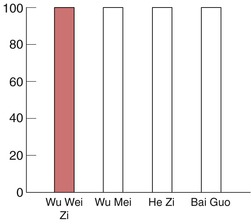 |
| Fig. 15.1. |
| Comparison of the herbs that stabilize the Lung-Qi. Wu Wei Zi ( Schisandrae fructus), Wu Mei ( Mume fructus), He Zi ( Chebulae fructus), Bai Guo ( Ginkgo semen). |
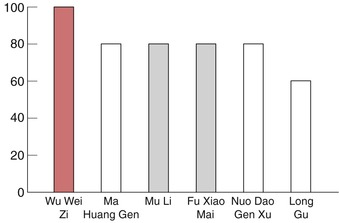 |
| Fig. 15.2. |
| Comparison of the herbs that stop sweating. Wu Wei Zi ( Schisandrae fructus), Ma Huang Gen ( Ephedrae radix)*, Mu Li ( Ostrea concha), Fu Xiao Mai ( Tritici fructus germinatus), Nuo Dao Gen Xu ( Oryzae glutinosae radix et rhizoma), Long Gu ( Mastodi fossilium ossis). |
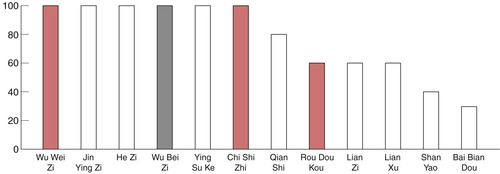 |
| Fig. 15.3. |
| Comparison of the herbs that restrain leakage from the intestines and stop diarrhea. Wu Wei Zi ( Schisandrae fructus), Jin Ying Zi ( Rosae laevigatae fructus), He Zi ( Chebulae fructus), Wu Bei Zi ( Chinensis galla), Ying Su Ke ( Papaveris somniferi pericarpium), Chi Shi Zhi ( Halloysitum rubrum), Qian Shi ( Euryalis semen), Rou Dou Kou ( Myristicae semen), Lian Zi ( Nelumbinis semen), Lian Xu ( Nelumbinis stamen), Shan Yao ( Dioscoreae rhizoma), Bai Bian Dou ( Dolichoris lablab semen). |
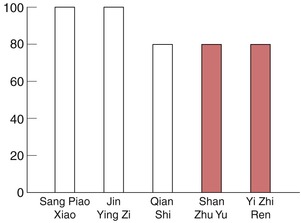 |
| Fig. 15.4. |
| Comparison of the herbs that stabilize the Bladder and treat incontinence and enuresis. Sang Piao Xiao ( Mantidis oötheca), Jin Ying Zi ( Rosae laevigatae fructus), Qian Shi ( Euryalis semen), Shan Zhu Yu ( Corni fructus), Yi Zhi Ren ( Alpiniae oxyphyllae fructus). |
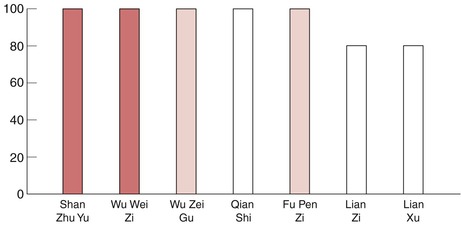 |
| Fig. 15.5. |
| Comparison of the herbs that stabilize the Kidney-Essence. Shan Zhu Yu ( Corni fructus), Wu Wei Zi ( Schisandrae fructus), Wu Zei Gu ( Sepiae seu sepiellae os), Qian Shi ( Euryalis semen), Fu Pen Zi ( Rubi fructus), Lian Zi ( Nelumbinis semen), Lian Xu ( Nelumbinis stamen). |

